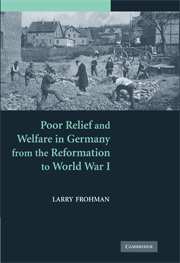Book contents
- Frontmatter
- Contents
- List of Tables and Figure
- Acknowledgments
- Introduction
- 1 Discipline, Community, and the Sixteenth-Century Origins of Modern Poor Relief
- 2 The Rise and Fall of the Workhouse: Poor Relief in the Age of Absolutism
- 3 Pauperism, Moral Reform, and Visions of Civil Society, 1800–1870
- 4 The State, the Market, and the Organization of Poor Relief, 1830–1870
- 5 The Assistantial Double Helix: Poor Relief, Social Insurance, and the Political Economy of Poor Law Reform
- 6 New Voices: Citizenship, Social Reform, and the Origins of Modern Social Work in Imperial Germany
- 7 The Social Perspective on Poverty and the Origins of Modern Social Welfare
- 8 From Fault to Risk: Changing Strategies of Assistance to the Jobless in Imperial Germany
- 9 Youth Welfare and the Political Alchemy of Juvenile Justice
- 10 The Social Evolution of Poor Relief, the Crisis of Voluntarism, and the Limits of Progressive Social Reform
- 11 Family, Welfare, and (Dis)order on the Home Front
- 12 Wartime Youth Welfare and the Progressive Refiguring of the Social Contract
- Conclusion: The End of Poor Relief and the Invention of Welfare
- Sources and Abbreviations
- Index
- References
Conclusion: The End of Poor Relief and the Invention of Welfare
Published online by Cambridge University Press: 17 July 2009
- Frontmatter
- Contents
- List of Tables and Figure
- Acknowledgments
- Introduction
- 1 Discipline, Community, and the Sixteenth-Century Origins of Modern Poor Relief
- 2 The Rise and Fall of the Workhouse: Poor Relief in the Age of Absolutism
- 3 Pauperism, Moral Reform, and Visions of Civil Society, 1800–1870
- 4 The State, the Market, and the Organization of Poor Relief, 1830–1870
- 5 The Assistantial Double Helix: Poor Relief, Social Insurance, and the Political Economy of Poor Law Reform
- 6 New Voices: Citizenship, Social Reform, and the Origins of Modern Social Work in Imperial Germany
- 7 The Social Perspective on Poverty and the Origins of Modern Social Welfare
- 8 From Fault to Risk: Changing Strategies of Assistance to the Jobless in Imperial Germany
- 9 Youth Welfare and the Political Alchemy of Juvenile Justice
- 10 The Social Evolution of Poor Relief, the Crisis of Voluntarism, and the Limits of Progressive Social Reform
- 11 Family, Welfare, and (Dis)order on the Home Front
- 12 Wartime Youth Welfare and the Progressive Refiguring of the Social Contract
- Conclusion: The End of Poor Relief and the Invention of Welfare
- Sources and Abbreviations
- Index
- References
Summary
Wartime welfare created a number of quandaries for poor relief officials. Simply because a son or husband was drafted, people who for years may have depended on poor relief fortuitously became eligible for much more generous wartime welfare. It was hard for relief officials to justify why these families should suddenly be treated in a preferential manner, or why other, equally needy families should not, and they were disturbed at the prospect that this preferential status might endure beyond the end of the war. They feared that the suspension of the poor laws during the war would unleash a massive wave of migration by the poor from the countryside to the cities and thus bring about a permanent geographical shift in the distribution of poor relief costs. They struggled to balance the demands of economy and the principle of deterrence against the government's policy of using wartime welfare as a means of preserving social and political stability on the home front. And they were worried that the constant harping on rights and the increasing willingness to depend on the assistance of others without any loss of social status or civic rights were weakening the self-reliance of the population. Although these questions exercised relief officials at the time, in the long run they proved to be issues of minor concern because other developments were challenging deterrent poor relief in more fundamental ways.
- Type
- Chapter
- Information
- Publisher: Cambridge University PressPrint publication year: 2008



